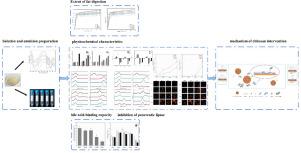壳聚糖对模拟胃肠条件下脂质消化的影响
IF 8.2
1区 农林科学
Q1 CHEMISTRY, APPLIED
引用次数: 0
摘要
先前的研究表明壳聚糖能够抑制乳剂中游离脂肪酸(FFA)的释放,但其结构影响(分子量,MW;去乙酰化程度,DD)对脂质消化的影响尚不清楚。本研究系统评估了壳聚糖在模拟胃肠道条件下的变异(MW: 3.2-670 kDa; DD: 71.2 - 92.5%)。结果表明,壳聚糖各剂型对玉米油消化均有不同程度的抑制作用。值得注意的是,高分子量壳聚糖(670 kDa, DD升高90%)表现出最强的抑制活性,使FFA释放率降低了约77%。从机制上讲,这是由于严重的乳液絮凝限制了酶的进入,加上增强的胆盐吸附(30%的结合)和脂肪分解抑制(57%的抑制)。这些发现强调了分子量/DD是壳聚糖脂质调节功效的关键决定因素,为设计以控制营养输送或减少热量摄取为目标的功能食品提供了战略基础。本文章由计算机程序翻译,如有差异,请以英文原文为准。

Impact of chitosan on lipid digestion under simulated gastro-intestinal conditions
Previous studies demonstrated chitosan's ability to inhibit free fatty acid (FFA) release in emulsions, yet its structural impacts (molecular weight, MW; deacetylation degree, DD) on lipid digestion remained unclear. This study systematically evaluated chitosan variants (MW: 3.2–670 kDa; DD: 71.2–92.5 %) under simulated gastrointestinal conditions. The results revealed that all chitosan formulations suppressed corn oil digestion to varying degrees. Notably, high molecular weight chitosan (670 kDa) with elevated DD (90 %) exhibited the strongest inhibitory activity, reducing the FFA release rate by approximately 77 %. Mechanistically, this resulted from severe emulsion flocculation limiting enzyme access, coupled with enhanced bile salt adsorption (30 % binding) and lipolysis suppression (57 % inhibition). These findings highlight MW/DD as critical determinants of chitosan's lipid-modulating efficacy, offering a strategic basis for designing functional foods targeting controlled nutrient delivery or reduced caloric uptake.
求助全文
通过发布文献求助,成功后即可免费获取论文全文。
去求助
来源期刊

Food Chemistry: X
CHEMISTRY, APPLIED-
CiteScore
4.90
自引率
6.60%
发文量
315
审稿时长
55 days
期刊介绍:
Food Chemistry: X, one of three Open Access companion journals to Food Chemistry, follows the same aims, scope, and peer-review process. It focuses on papers advancing food and biochemistry or analytical methods, prioritizing research novelty. Manuscript evaluation considers novelty, scientific rigor, field advancement, and reader interest. Excluded are studies on food molecular sciences or disease cure/prevention. Topics include food component chemistry, bioactives, processing effects, additives, contaminants, and analytical methods. The journal welcome Analytical Papers addressing food microbiology, sensory aspects, and more, emphasizing new methods with robust validation and applicability to diverse foods or regions.
 求助内容:
求助内容: 应助结果提醒方式:
应助结果提醒方式:


